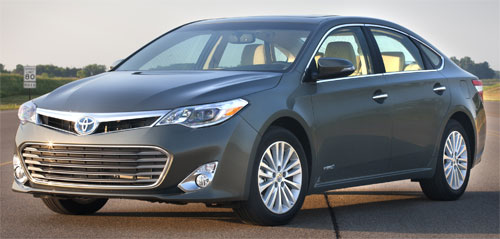2013 Toyota Avalon Hybrid
As the brand’s flagship, it’s important for the Toyota Avalon to boast the full spectrum of Toyota technology. So, when the all-new 2013 Avalon was launched, it finally included a hybrid model. Now we took a brief spin in the Avalon Hybrid a few months back, but we thought more time was necessary to get a true sense of what hybrid power brings to Toyota’s top sedan.
As you would expect, the main thing the 2013 Toyota Avalon Hybrid brings to the table is better fuel mileage. Just how much better? Well, Government Fuel Economy Ratings are 40-City, 39-Highway, and 40-Combined. Our mixed-driving average was close to right on the money at 38.9 miles-per-gallon. Staying mostly in the city, we averaged an even better 45.1, both on Regular grade gas. That’s a huge improvement over the 21-City, 31-Highway, and 25-Combined of the V6 Avalon; and certainly makes it stand out among full-size sedans.
 The hybrid system works very well, which is no surprise as it is the proven Hybrid Synergy Drive out of the Camry Hybrid; which combines a 156-horsepower 2.5-liter I4 engine with 2 electric motors that generate 105 kW of additional boost. All of the power then flows through a CVT transmission. 244.8-volts worth of traditional Nickel Metal-Hydride batteries are located in the trunk, and rob just 2.0 cubic-ft. of storage space for a still very good total of 14.0.
The hybrid system works very well, which is no surprise as it is the proven Hybrid Synergy Drive out of the Camry Hybrid; which combines a 156-horsepower 2.5-liter I4 engine with 2 electric motors that generate 105 kW of additional boost. All of the power then flows through a CVT transmission. 244.8-volts worth of traditional Nickel Metal-Hydride batteries are located in the trunk, and rob just 2.0 cubic-ft. of storage space for a still very good total of 14.0.
Much like the V6 Avalon, the Hybrid’s ride is very solid, but in no way sporty. There’s noticeably more noise coming from under the hood when under full throttle, but cruising in near silence in EV mode makes up for it.
All-in-all, the Hybrid weighs 124-pounds more than the V6; but it adds much more to acceleration times, as you lumber along to 60 in 8.0-seconds. Running out the full ¼ will take you 16.3-seconds at 89 miles-per-hour.
 The interior has a broad, horizontal theme with the same low cowl, hand stitching, and multiple material textures with wood trim as in the V6 car. We complained before about the small NAV screen, but like the optional Blind Spot Monitoring and Rear Cross Traffic Alert. Most controls are easily within reach; while the seats, though firm, offer good long distance comfort. Long doors make for easy getting in and out.
The interior has a broad, horizontal theme with the same low cowl, hand stitching, and multiple material textures with wood trim as in the V6 car. We complained before about the small NAV screen, but like the optional Blind Spot Monitoring and Rear Cross Traffic Alert. Most controls are easily within reach; while the seats, though firm, offer good long distance comfort. Long doors make for easy getting in and out.
Pricing comes in at $36,350, which is about 45-hundred dollars more than a base Avalon, but almost 4-grand under the Lexus ES300 Hybrid with the same powertrain.
Does that make the 2013 Toyota Avalon Hybrid a bargain or a bust? Well to us, it’s a great, big car for a very good price, with fuel economy that rivals most compact cars. But at the end of the day the full-size sedan market is a very small one. However, being the most fuel efficient should go a long way towards helping the Avalon stay near the top of the segment.
Specifications
- Engine: 2.5-liter I4
- Horsepower: 156
- Torque: 156 lb-ft.
- 0-60 mph: 8.0 seconds
- 1/4 mile: 16.3 seconds @ 89 mph
- EPA: 40 mpg city/ 39 mpg highway






